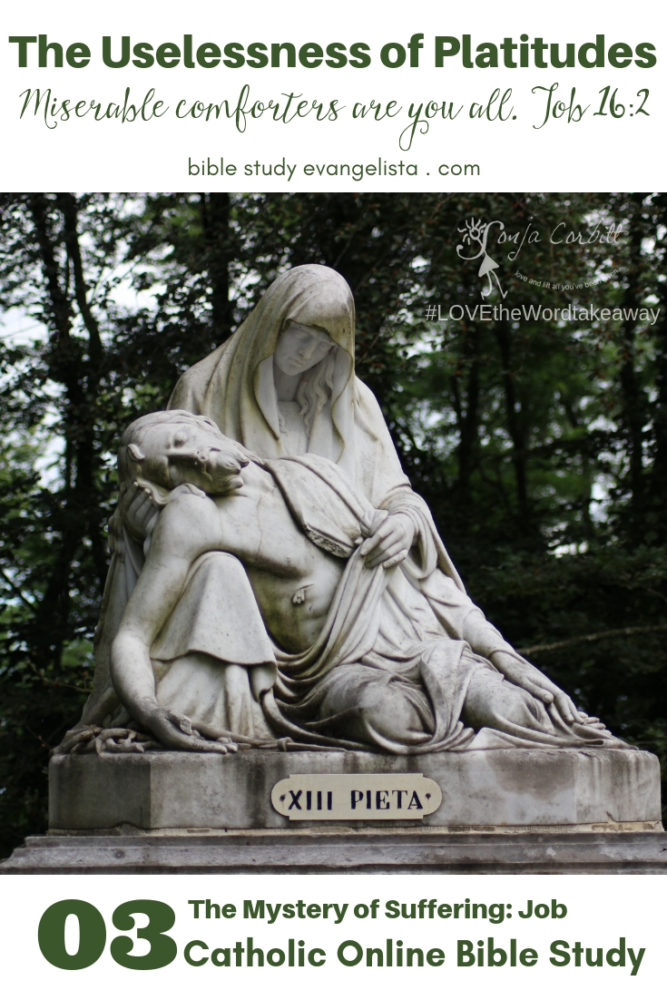The word “compassion” means to suffer with. More than Jesus’ healings, teachings, and even post resurrection-appearances, the Bible emphasizes Jesus’ passion. Theological reflection suggests that communion in suffering, “compassion,” is really what Jesus offers humankind. It seems the gospel writers, particularly, were most inspired to remember that Jesus came to be with us, inseparably. No illness, no loss, no death, no suffering, no storm, no scandal, no sin, no unruly feelings, no craziness, no darkness of spirit, no self-hate can drive him away. Not just over us or ahead of us – but with us – he saves us.
Job teaches us that when others are going through trials, the last thing they need is for us to tell them what we think we know about God or to try and speak on God’s behalf. Instead, in our service to those who grieve, we imitate Christ, and simply “suffer with” them.

Thank you, Elizabeth B; Trish R; Julie L; Maryanne C; Jackie S; Jerry C; Michelle S; and Sharon R, my newest Friends of the Show, for loving and lifting me!
LOVE the Word® is a Bible study method based on Mary’s own practice: lectio without the Latin.
L – Listen (Receive the Word.)
O – Observe (Choose one or more of the following personality approaches to connect the passage to your life and recent events.)
F | Franciscan – Is there another icon in so many pockets and purses, hung on more bedroom walls, gracing as many sanctuaries, as the crucifix? The attraction of the crucifix attests to our need for the compassionate companionship of God-become-human. Take some time to touch the five wounds of Christ on a crucifix, remembering the times He has suffered with you personally.
I | Ignatian – Using all your senses, imagine you are Job, sitting in your pile of ashes, mourning the loss of your children and property, scratching your oozing sores with a piece of pottery, listening to the droning of your wife and “friends.” What can you sense about Job’s state of mind and heart? How does he feel? How do you feel?
A | Augustinian – If you’re going through your own personal trial of some kind right now, will you ask God to deepen your relationship with Him? Will you tell God that you no longer want to seek answers, but that you want to seek Him?
If you know someone else who is suffering right now, how can you “suffer with” them? Will you pray for God to deepen that person’s relationship with Him through this trial? What action can you take to show your willingness to suffer with them through their trial?
T | Thomistic – The Thomists often have a more difficult time building and experiencing community than other temperaments, therefore they need community as much or even more than others. Let’s get you out of your comfort-zone, Thomist: resolve to approach someone whom you know is experiencing trials right now. Ask them how they are feeling, and patiently listen to all they are willing to share with you. Perhaps you repeat their feelings back to them to show your understanding. If you are the one experiencing suffering, use your Verbalize step to talk to God about your emotions, knowing that expression is a necessary part of the grief process.
V – Verbalize (Pray about your thoughts and emotions.)
Remembering that He loves you and that you are in His presence, talk to God about the particulars of your O – Observe step. You may want to write your reflections in your LOVE the Word® journal. Or, get a free journal page and guide in the right-hand margin.
E – Entrust (May it be done to me according to your word!)
Dearest Jesus, who wept at the death of your friend
and taught that they who mourn shall be comforted,
grant us the comfort of your presence in our loss.
Send Your Holy Spirit to direct us
lest we make hasty or foolish decisions.
Send Your Spirit to give us courage
lest through fear we recoil from living.
Send Your Spirit to bring us your peace
lest bitterness, false guilt, or regret take root in our hearts.
The Lord has given.
The Lord has taken away.
Blessed be the name of the Lord.
Amen+
.
*LOVE the Word® exercises are offered according to FIAT: the four personalities, or “prayer forms,” explored in Prayer and Temperament, by Chester Michael and Marie Norrisey: Franciscan, Ignatian, Augustinian, and Thomistic: FIAT! These prayer forms correspond to the Myers-Briggs personality types.
Come with Us
Share the LOVE
Read the Transcript
You can download a complete, word-for-word transcript.
Protected Content. Click Here to sign in
Courtesy of Dora Donovan, who does our transcriptions for you.




I enjoy the podcast so much. How can I download & read the transcript? God bless your ministry!
Transcripts come out about a week after the show. They will appear at the bottom of the show’s post on my website.